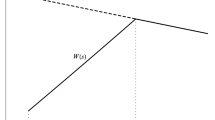Abstract
The present paper considers cost-sharing contracts in the presence of firm-specific training and examines the optimal wage profiles in a hierarchical firm. Our analysis shows that (a) a two-part burden on the lower-level employee exists (b) the lower-level employees may cross-subsidize the higher-level employees, leading to inequality in earned income (c) the relative bargaining strengths of the employers and the employees play an important role in determining the wage profiles and the employment structures.
Similar content being viewed by others
References
Aoki, M., (1982) Equilibrium Growth of the Hierarchial Firm, American Economic Review, 72, pp. 311–329.
Bai, En, C. and Y. Wang (2001), Uncertainty in Labour Productivity and Specific Human Capital Investment, University of Minnesota Working Paper No. 32.
Becker, G.S., (1964) Human Capital, Columbia University Press, New York.
Carmichel, H. L., (1983) Firm-Specific Human Capital and Promotion Ladders, Bell Journal of Economics, 14, pp. 251–258
Fafchamps, M. and A.R. Quisumbing (1998), Human Capital, Productivity and Labour Allocation in Rural Pakistan, Stanford University Working Paper No.19.
Frantzen, D., (2000), R&D, Human Capital and International Technology Spillovers: A Cross-Country Analysis, Scandinavian Journal of Economics, 102, pp. 33–47
Hashimoto, M., (1979) Bonus Payment, On-the-Job Training and Lifetime Employment in Japan, Journal of Political Economy, 87, pp. 1086–1104
Huang, L., (2001), Industry-specific Human Capital and Wage Determination in Taiwan, Asian Economic Journal, 15, pp. 19–37
Lazear, E., (1979) Why is there Mandatory Retirement?, Journal of Political Economy, 87, pp. 1261–1284
Lazear, E and S. Rosen (1981) Rank Order Tournaments as Optimum Labour Contracts, Journal of Political Economy, 89, pp. 841–864
Miyazaki, H., (1984) Internal Bargaining, labour Contracts and Marshallian Theory of the Firm, American Economic Review, 74, pp. 381–393.
Ohashi, I., (1983) Wage Profiles, Layoffs and Specific Training, International Economic Review, 24, pp. 169–182.
Oi, W., (1962) Labouras a Quasi-Fixed Factor, Journal of Political Economy, 70, pp. 538–555
Saint Paul, G., (1998) Labouras a Factor of Production, MIT Press
Author information
Authors and Affiliations
Rights and permissions
About this article
Cite this article
Ghosh, S. Productivity, Wages and Human Capital. J. Quant. Econ. 1, 147–155 (2003). https://doi.org/10.1007/BF03404655
Published:
Issue Date:
DOI: https://doi.org/10.1007/BF03404655




